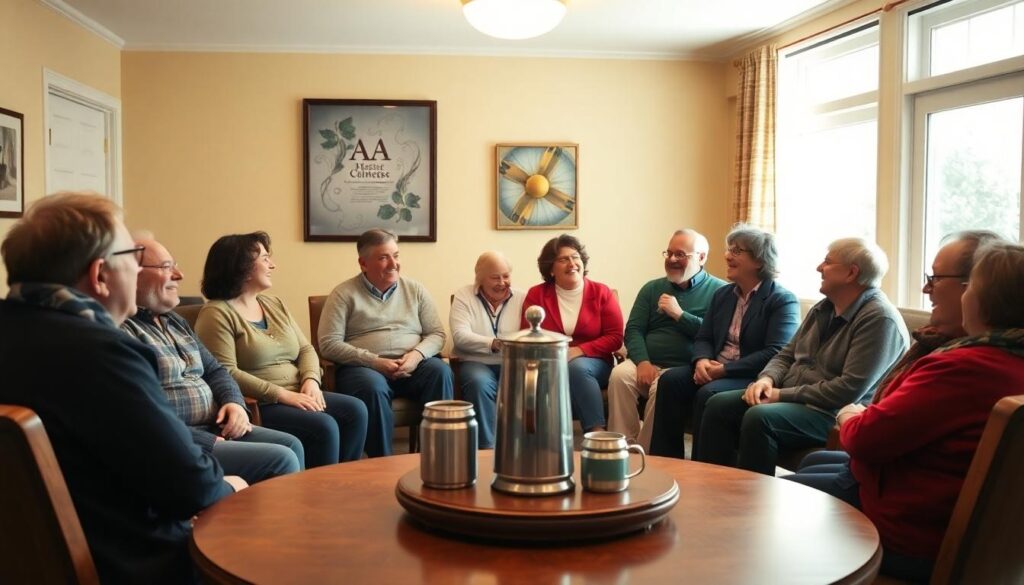Laughter truly is the best medicine, and when it comes to recovery, AA jokes offer a unique blend of humor that helps lighten the burden of sobriety. We’ve collected some of the funniest, most relatable jokes that poke fun at the addiction recovery journey while remaining respectful of the serious work being done.
Finding humor in difficult situations isn’t just entertaining—it’s therapeutic. Research shows that laughter can reduce stress, boost immune function, and create bonds between people sharing similar experiences. That’s why AA meetings often incorporate humor as a tool for healing and connection. In this text, we’ll share our favorite recovery jokes that’ll have you nodding in recognition and laughing out loud.
10 Hilarious AA Jokes That Will Make Recovery More Enjoyable
- The First Step Fumble: An alcoholic walks into his first AA meeting and says, “Hi, I’m Bob, and I’m an alcoholic. Do we get name tags? Because I might forget everyone’s names after a few drinks.” The room falls silent until the facilitator gently explains, “That’s kind of what we’re trying to avoid here, Bob.”
- Sponsor Shopping: Why did the newcomer go through five sponsors in his first month? He was looking for one who’d say, “Yeah, maybe just one beer is fine.” We all know that sponsor doesn’t exist!
- Meeting Mathematic: How many alcoholics does it take to change a lightbulb? Just one, but they need to really want to change! This joke perfectly captures the essence of personal readiness for transformation that’s central to recovery.
- The Coffee Conundrum: What’s an alcoholic’s favorite part of an AA meeting? The coffee—it’s the only thing there that’s more addictive than what they’re trying to quit! Many members joke that they’ve simply traded one addiction for caffeine.
- Sobriety Anniversary: A man celebrates five years sober and announces, “I’ve saved so much money not drinking that I bought myself a new car!” His sponsor asks, “How much did the car cost?” The man replies, “About three months of my old bar tab.”
- The Higher Power Hotline: An AA member was asked to describe his higher power. He replied, “My higher power has caller ID and doesn’t answer when I’m about to make a bad decision.” Sometimes spiritual connections work in mysterious ways!
- Recovery Dating: What’s the first rule of dating in recovery? Make sure they’ve been sober longer than their milk has been in the fridge. Relationships require stability that comes with consistent sobriety.
- The Relapse Reality: A member returns after a relapse and says, “I tested my theory that I could handle just one drink.” The group asks, “What happened?” He responds, “Turns out my theory had some holes in it… about 12 bottles worth.”
- Twelve-Step Twist: Why don’t alcoholics make good revolutionaries? They stop at step twelve! This playful take on the program’s structure highlights the commitment to completing all steps of recovery.
- The Gratitude Flip: What’s the difference between an alcoholic at their first meeting and at their hundredth? At the first, they say, “I can’t believe this happened to me.” At the hundredth, they say, “I can’t believe what almost didn’t happen for me.” Perspective shifts are among recovery’s greatest gifts.
Finding Humor in the Journey: Why Laughter Matters in AA

The Therapeutic Value of Humor in Recovery
Research confirms that humor serves as a powerful therapeutic tool for those in addiction recovery. Studies have consistently linked humor to enhanced emotional resilience and important stress reduction during the recovery process. When individuals in AA programs use adaptive humor styles—particularly affiliative (bonding) and self-improving (coping)—they experience more successful recovery outcomes. A revealing study comparing 30 individuals with over five years of sobriety to 30 newcomers demonstrated that long-term participants employed these mature humor styles more frequently than maladaptive approaches like aggression or self-deprecation. We’ve also learned that humor effectively mitigates physiological stress responses, lowering inflammation and pain perception for those on the sobriety journey.
Building Connections Through Shared Laughter
Shared laughter creates profound connections within AA communities, establishing bonds that support long-term recovery. In group settings, humor highlights the common experiences of addiction’s “insanity,” allowing participants to transform painful memories into moments of connection. Members often use absurd or chaotic anecdotes from their past to build intimacy and create safe spaces for vulnerability. This collective laughter reinforces group cohesion—a critical factor research identifies as essential for sustaining recovery. The ability to laugh together about the challenges of sobriety helps diminish depressive symptoms during stressful periods while enabling honest reflection without overwhelming distress. Reframing past struggles comically reduces their emotional weight, making them easier to process and share within the supportive AA community.
Classic “One Day at a Time” AA Jokes That Never Get Old

In AA meetings across the country, humor serves as both medicine and glue for the recovery community. These classic jokes have stood the test of time, bringing laughter to generations of members while reinforcing core recovery principles.
First-Step Funnies
“First-step” humor revolves around the fundamental AA principle of admitting powerlessness over alcohol—often with a hilarious twist. Here are some jokes that perfectly capture this essential step:
- “How many alcoholics does it take to change a lightbulb? Just one, but they need to really want to change.”
- “An alcoholic walks into a bar… which was his first mistake.”
- “I finally admitted I was powerless over alcohol when I realized my recycling bin sounded like a wind chime during a hurricane.”
- “They say denial isn’t just a river in Egypt. In my case, it was an entire ocean with me trying to swim upstream.”
- “I knew I’d hit my bottom when my dog started hiding my car keys.”
Sponsor-Related Humor
The sponsor-sponsee relationship provides endless material for recovery humor, highlighting both the wisdom and occasional absurdity of this crucial guidance:
- “My sponsor told me to ‘take it one day at a time.’ So I asked if I could have tomorrow off.”
- “My sponsor suggested I write down all my resentments. I said, ‘Do you have enough paper?'”
- “My sponsor told me to pray for people I don’t like. My knees are getting sore from all that praying.”
- “When I complained about the program being hard, my sponsor said, ‘Of course it’s difficult—if it were easy, you’d have done it drunk.'”
- “My sponsor has this annoying habit of being right all the time. I’ve considered finding a new one who’s wrong more often.”
These jokes reflect the special bond between sponsors and sponsees, where tough love is delivered with a side of humor. AA members often share these quips to acknowledge the sometimes challenging guidance that eventually leads to growth and recovery.
Self-Deprecating AA Jokes That Help Put Ego in Check

In Alcoholics Anonymous meetings, humor serves as a powerful tool to deflate inflated egos—often considered a major obstacle to recovery. These self-deprecating jokes help members maintain humility while handling the challenging path to sobriety.
Humbling Moments We Can All Relate To
Recovery journeys are filled with moments that remind us we’re all human. One classic anecdote involves a nervous newcomer who becomes increasingly uncomfortable when an older member keeps staring at them during detox. This universal feeling of being scrutinized captures the vulnerability we all experience when first entering the rooms.
Another relatable joke that circulates in meetings points to the sometimes directionless feeling of early recovery: “You must be an AA sponsee… You don’t know where you are or where you’re going.” This quip perfectly captures how many members initially rely heavily on sponsors for guidance before developing their own recovery compass.
The equalizing nature of addiction is often emphasized through humor like: “There are no small alcoholics or big alcoholics—you’re either pregnant or you’re not.” This straightforward comparison effectively communicates that addiction doesn’t discriminate based on quantity consumed—abstinence remains the goal for everyone in the program.
When Denial Gets Funny
Denial—the alcoholic’s faithful companion—becomes much less threatening when addressed through humor. The saying “Poor Me, Poor Me, Pour Me Another One” brilliantly mocks the self-pity that often precedes relapse, turning a dangerous mindset into a memorable warning.
Safety in sobriety is frequently reinforced through pithy statements like “If you don’t want to slip, stay away from where it’s slippy.” This simple advice reminds members to avoid high-risk environments that might trigger old behaviors.
The wisdom “You’ve got to drink again because you forgot what makes you sober” (attributed to a member named Bob) humorously addresses the dangerous complacency that can develop in long-term recovery. It serves as a reminder that forgetting our alcoholic nature can lead right back to active addiction.
AA meetings often feature practical spiritual guidance through sayings like “Get on your knees, then get on your feet,” emphasizing that prayer must be followed by action. Similarly, the warning “If you sit in a barber’s chair long enough, you’ll get a haircut” vividly illustrates the danger of lingering near triggers and temptations.
Creative acronyms also help members reframe challenging concepts, with “GOD” being redefined as “Guidance Order Direction”—making spiritual principles more accessible to those who might struggle with traditional religious concepts.
Meeting Room Classics: AA Jokes About Group Dynamics

In AA meetings, humor serves as more than just comic relief—it strengthens group identity and creates bonds between members on their recovery journey.
The Coffee Pot Chronicles
We’ve all witnessed the near-religious devotion to coffee at AA meetings. “They say I’ve replaced one addiction with another, but at least my coffee mug doesn’t make me text my ex at 2 AM!” Coffee consumption at meetings has become so legendary that many groups joke about needing a separate 12-step program just for caffeine addiction. Members often quip that you can measure someone’s seniority in the program by how precisely they can time their refill trips without missing the best shares.
Those Memorable Share Moments
AA meetings are filled with surprisingly humorous story-telling moments that resonate with everyone in the room. One classic example that continues to circulate is a member who summarized their pre-sobriety life with: “If my life were a book it would be called How To Lose Friends And Alienate People.” Another unforgettable share came from a newcomer who explained away his DUI accident by earnestly claiming he “must have hit a sheet of ice”—even though being intoxicated, driving 50 mph in a 25 zone, and it being the middle of summer in a residential area. These self-deprecating stories serve a deeper purpose beyond laughter; they demonstrate the common thread of denial that many members recognize from their own journeys. Research shows that successfully recovering individuals tend to use these adaptive humor styles more frequently, creating an environment where painful experiences transform into moments of connection and healing.
Recovery Program Puns That Only AA Members Understand

The language of recovery has spawned its own unique brand of humor, with puns and wordplay that often leave outsiders scratching their heads while AA members chuckle knowingly.
Big Book Humor
AA literature, especially the Big Book, serves as fertile ground for recovery-themed jokes. Members frequently share humorous misinterpretations of page numbers, like the classic: “My sponsor told me to read page 69 for sex problems—I accidentally turned to page 96!” This pun cleverly references the Big Book’s practical advice, as page 96 actually discusses persistence in finding willing prospects. Other jokes playfully satirize well-known phrases from the text, such as “Do not be discouraged if your prospect does not respond at once,” turning serious guidance into lighthearted commentary on sponsorship challenges. Literature-based humor creates an instant connection among members who recognize these references, reinforcing their shared knowledge and experience within the program.
Step Work Wisecracks
The Twelve Steps provide endless material for recovery humor, particularly around the difficulties of self-reflection. “Why did the math book look sad? Too many problems!”—a common joke repurposed to highlight the challenges of Step 4’s searching moral inventory. Another favorite among AA circles: “I’ve got 99 problems, and my sponsor says they all start with me,” perfectly capturing the humbling realization that our own thinking often lies at the root of our troubles. Step-related humor frequently pokes fun at members’ initial resistance to introspection, with jokes like “Step 4: Made a searching and fearless moral inventory… of everyone else’s mistakes.” These wisecracks serve as gentle reminders of recovery principles while acknowledging the very human tendency to avoid uncomfortable truths about ourselves.
How to Use AA Jokes Appropriately in Recovery Settings

Knowing Your Audience
Sharing jokes in Alcoholics Anonymous settings requires careful consideration of who’s listening. Effective AA humor prioritizes empathy and sensitivity while resonating with shared recovery experiences. We’ve found that the most appreciated jokes connect to common situations members face, such as memorable sponsor interactions or relatable scenarios like staring at empty refrigerators that symbolize emotional voids. Newcomers especially deserve consideration, as they may not yet have the perspective to find humor in certain aspects of recovery. Always gauge the room’s energy before sharing jokes that reference struggles, ensuring your humor builds bridges rather than creating distance between members.
When Humor Helps and When It Hurts
Lighthearted jokes can transform tense moments into opportunities for connection in recovery settings. Comparing food cravings to “relapses” or sharing amusing stories about “wobbly legs” during early sobriety often eases tension and fosters camaraderie among members. But, humor crosses the line when it mocks actual relapses, perpetuates harmful stereotypes, or targets sensitive topics like past trauma. Self-deprecating jokes work particularly well—for instance, “Why are the best comedians at AA? You can’t spell ‘truth’ without ‘rum’—wait, honesty!” Research supports this approach, as recovery-exact humor releases dopamine and aids in stress reduction, contributing to psychological resilience-building. Timing matters significantly—avoid cracking jokes during emotionally heavy discussions or when someone is vulnerably sharing their story.
Best Practices
Moderators and long-time members should model appropriate humor that uplifts rather than isolates individuals in the group. We recommend focusing on universal truths in recovery, such as struggles with complete honesty or the amusing side effects of living sober in a drinking industry. Always verify comfort levels before launching into humorous anecdotes, especially in mixed groups with varying lengths of sobriety. Consider the potential impact of your jokes—will they reinforce recovery principles or potentially undermine them? Studies suggest that positive humor that aligns with AA principles strengthens group bonds while supporting individual healing journeys. Remember that the primary purpose remains unchanged: helping alcoholics achieve and maintain sobriety, with laughter serving as a supportive tool rather than a distraction.
Celebrity and Pop Culture AA Jokes With a Recovery Twist

When celebrities and pop culture collide with recovery humor, the results can be both entertaining and insightful. These jokes offer a unique perspective on sobriety by incorporating familiar faces and cultural references that many in recovery can appreciate.
Stars in Recovery
Famous figures who’ve openly discussed their sobriety journeys often become the subjects of gentle humor in AA circles. Members frequently relate to celebrity experiences, finding common ground in the universal challenges of recovery regardless of fame or fortune. The AA Grapevine occasionally features cartoons and jokes that playfully reference public figures without mocking their struggles.
Hollywood Meets Higher Power
“Robert Downey Jr. didn’t need Iron Man’s suit to become a real-life superhero—he just needed a good sponsor and 90 meetings in 90 days!”
“Bradley Cooper proved you don’t need to be ‘The Hangover’ guy in real life to have an amazing career.”
“When Drew Barrymore talks about her ‘E.T. phone home’ moment, AA members know she’s referring to that crucial call to her sponsor!”
Pop Culture References With a Twist
AA humor often repurposes well-known movie quotes, song lyrics, and TV catchphrases to reflect recovery experiences. These references create instant recognition while providing a fresh perspective on familiar cultural touchstones. The jokes serve as a bridge between mainstream culture and the recovery community, making sobriety concepts more accessible.
Finding the Balance
While celebrity-themed AA jokes can lighten the mood at meetings, they’re most effective when they emphasize recovery principles rather than celebrity gossip. The best examples highlight triumph over addiction rather than focusing on the sensational aspects of celebrity struggles. According to recovery community standards reflected in AA Grapevine publications, humor should uplift rather than diminish the recovery journey.
Shared Humanity
Celebrity jokes in AA settings eventually reinforce a crucial truth: addiction doesn’t discriminate based on fame, wealth, or status. The humorous references to well-known recovery journeys remind members that everyone faces similar challenges in sobriety. This shared experience creates connections that transcend social boundaries, fostering a sense of community among all who seek recovery.
Creating Your Own AA Humor: Finding the Funny in Your Story

Sharing Personal Stories with a Twist
Transforming your recovery journey into humorous anecdotes can be incredibly therapeutic. Research shows that sharing personal stories in a lighthearted way helps others relate while making your own recovery process more enjoyable. We’ve found that the most impactful AA humor comes from authentic experiences—those moments of clarity, confusion, or revelation that mark the sobriety journey. Try focusing on universally relatable situations like your first meeting jitters or misunderstandings about program terminology. Members often bond over stories about initially thinking “Higher Power” referred to electricity or confusing “working the steps” with a workout routine.
Developing Inside Jokes Within Your Group
Inside jokes serve as powerful connectors within recovery communities. Studies confirm that developing humor unique to your recovery group strengthens bonds among members, creating a sense of belonging that supports long-term sobriety. We recommend paying attention to recurring themes or situations in your meetings that everyone experiences. Coffee obsessions, frequent bathroom breaks during long shares, or the predictable patterns of certain regular attendees often become affectionate group jokes. These shared experiences, when approached with kindness rather than mockery, create a comfortable atmosphere where members feel understood and accepted.
Balancing Humor with Respect
Finding the balance between funny and respectful is essential when creating AA humor. Adaptive humor styles, particularly affiliative and self-improving approaches, have been linked to positive recovery outcomes. We suggest testing potential jokes by asking yourself if they uplift others or simply make you feel better at someone else’s expense. Focus on humor that celebrates progress rather than ridicules shortcomings. Gentle jokes about the collective journey—like everyone’s initial resistance to suggestions or universal struggles with Step 4—create unity rather than division.
Using Humor as a Teaching Tool
Humor can effectively reinforce recovery principles in memorable ways. Personal stories with humorous elements often stick with listeners longer than straightforward advice. We encourage incorporating program wisdom into your jokes by highlighting the ironic situations that arise when applying recovery principles to everyday life. For example, stories about attempting to “turn it over” while simultaneously micromanaging every detail, or practicing acceptance while arguing with traffic, resonate with members who recognize these contradictions in themselves. This approach transforms personal struggles into valuable lessons wrapped in laughter.
The Best Places to Find Recovery-Friendly AA Jokes Online

Recovery Forums and Communities
SoberRecovery.com hosts a dedicated forum thread specifically for AA-related humor where members share classic jokes that have been circulating in the recovery community for years. Their collection includes the famous “page 69 vs. 96” mix-up in the Big Book and lighthearted stories about sponsor interactions. These forums create a space where recovery principles are reinforced through humor while fostering a sense of community among members who understand the unique challenges of sobriety.
Social Media Platforms
Facebook groups have become popular hubs for recovery-themed humor, with “Dank Rehab Memes” standing out with its impressive 35.9K members. This vibrant community blends humor with shared recovery experiences, creating content that resonates with those on the sobriety journey. Pinterest offers many user-curated “AA Humor” boards featuring collections of sobriety-themed jokes, comics, and motivational quotes that can provide both entertainment and encouragement for those in recovery.
Regional AA Websites
Local AA websites often include humor sections that reflect the regional character of their recovery communities. Toledo AA Meetings’ website features region-exact jokes, including a memorable Alaskan ice-fishing anecdote involving a humorous misunderstanding that captures the essence of recovery humor. These local collections often contain jokes that reference exact meeting locations or regional recovery culture, making them especially meaningful to members in those areas.
Dedicated Humor Platforms
LaughStorm (2025) provides a curated selection of newer AA-centric jokes that keep the recovery humor fresh and relevant. Their content includes witty quips about “the recovery diet” and amusing sponsor advice that highlights the everyday realities of maintaining sobriety. These platforms typically organize jokes by themes like the Twelve Steps, sponsorship, or meeting experiences, making it easy to find humor related to exact aspects of the recovery journey.
All these resources use humor as a powerful tool to reinforce recovery principles while creating connections through relatable content. Most of these platforms offer free access to their joke collections, and the content is designed for easy sharing at meetings or within online support groups, helping to spread laughter and healing throughout the recovery community.
Balancing Humor and Respect: The Boundaries of AA Jokes
Laughter truly is powerful medicine on the road to recovery. AA jokes offer more than just comedic relief—they’re bridges that connect us through shared experiences while making the journey a little lighter.
We’ve seen how humor strengthens community bonds creates teaching moments and transforms painful memories into opportunities for growth. Whether it’s coffee addiction jokes sponsor relationships or creative acronyms these moments of levity serve a deeper purpose.
Remember that the best recovery humor uplifts rather than diminishes. By sharing relatable stories and finding joy in our collective challenges we’re not just laughing—we’re healing together. The right joke at the right time might be exactly what someone needs to keep moving forward one day at a time.
Frequently Asked Questions
Why is humor important in addiction recovery?
Humor in recovery serves as a therapeutic tool that builds emotional resilience and reduces stress. It creates connections among people facing similar struggles, transforms painful memories into moments of bonding, and provides much-needed relief during challenging times. Research shows that positive humor styles are linked to better recovery outcomes by fostering group cohesion and creating safe spaces for vulnerability.
Are there different types of AA jokes?
Yes, AA humor comes in several varieties: “One Day at a Time” classics that reinforce core principles, “First-Step” jokes about admitting powerlessness, sponsor-related humor reflecting guidance relationships, self-deprecating jokes that maintain humility, denial-focused humor, and recovery puns or wordplay. Each type serves different purposes in the recovery community while maintaining the shared experience of sobriety.
How do AA jokes help build community?
AA jokes strengthen group identity by creating inside humor that only those in recovery fully understand. This shared laughter fosters deep connections, diminishes feelings of isolation, and reinforces the idea that no one is alone in their struggles. Humor creates bonds between members across different backgrounds, creating a sense of belonging essential for long-term recovery success.
Can humor be inappropriate in recovery settings?
Absolutely. While humor is beneficial, it must be used thoughtfully. Jokes that mock relapse, belittle the recovery process, or target vulnerable newcomers can be harmful. Effective recovery humor should connect with shared experiences rather than alienate members. The best approach is empathetic humor that uplifts rather than ridicules, being especially mindful of newcomers’ sensitivities.
Where can I find recovery-friendly AA jokes?
Recovery-friendly jokes can be found on platforms like SoberRecovery.com forums, recovery-focused social media groups on Facebook and Pinterest, regional AA websites, and dedicated humor platforms like LaughStorm. Most of these resources are free and designed for easy sharing at meetings or in online support groups, helping spread laughter throughout the recovery community.
How can I create my own recovery humor?
Create personal AA humor by sharing lighthearted anecdotes from your own recovery journey—focus on relatable struggles and insights gained along the way. The best recovery humor comes from authentic experiences that others can identify with. Remember to keep stories respectful, uplift rather than ridicule, and balance humor with the seriousness of recovery principles.
What role does coffee play in AA humor?
Coffee is legendary in AA culture and features prominently in recovery humor. Jokes about needing a separate 12-step program for caffeine addiction are common. The coffee obsession at meetings represents a safer addiction and serves as a social lubricant that facilitates connection. These jokes celebrate the ritual of coffee as an integral part of the AA experience.
How does humor help with denial in recovery?
Humor effectively addresses denial by making tough truths more digestible. Clever sayings and jokes highlight the dangers of self-pity and complacency in recovery without triggering defensiveness. By laughing at common forms of denial together, members can recognize these patterns in themselves more easily and embrace the honesty necessary for successful recovery.







